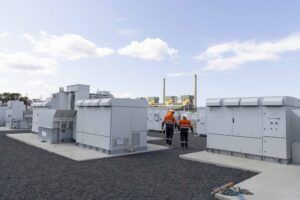Fool me once shame on you, fool me twice shame on me. Anyone working in the clean energy sector back in 2013 saw the so-called “carbon tax” for what it was – a cynical political play. Last week former prime ministerial chief of staff to Tony Abbott Peta Credlin admitted as much in an interview: that the electorate was fooled and lied to about energy.
This lie – that the carbon price was to blame for rising energy bills and once it was abolished everything would be hunky dory, was just one of many mistruths that have shaken public trust in energy companies and our politicians.
As readers of RenewEconomy know we are in the midst of an energy transition and the way the energy system of the 21st century will work is very different to how it has worked throughout the 20th century.
Transitions, by their very nature, can be messy and full of conflict as new actors emerge, established actors defend their turf, and the media and commentators weigh in on different sides. Most people don’t know what to think or whose opinion to trust.
Right now, everyone working in the clean energy industry is in danger of being painted as just one side of an increasingly polarised debate.
In addition, there are few known, longstanding and trusted brands or sources of information in the clean energy space for the engaged, but not super-geek consumer or community members (aka those who don’t read RenewEconomy).
In short, we have a crisis of trust in our energy system that comes just at a time when nuanced solutions are required and energy is once again the topic of dinner party and barbecue conversations.
Unfortunately, there’s no silver bullet. However, that said, there is one strategy that must be part of the mix: trusted community partners.
Working in partnership with trusted community organisations is a strategy that more and more energy actors are embracing. Just last week Ausnet Services announced a commercial micro-grid trial in partnership with community energy group Totally Renewable Yackandandah. This project, which involves installing solar and storage in a series of houses in a new estate, didn’t require the involvement of TRY as Ausnet could have approached the households themselves.
However, if they had done so they would have had little understanding of the context, the community dynamics and relationships, with a lower likelihood of success. Instead, by partnering with an organisation that has strong community roots and is well respected they are able to craft both a product offering and process that’s exceeded all expectations.
Ausnet isn’t alone in this. Suncrowd is a start-up providing solar and storage to households in New South Wales and is partnering with community groups through a series of jointly organised public forums. Renewable energy developer CWP last week held public forums in partnership with community organisations (such as Starfish Initiatives) in New England to explore how local people could directly invest in and benefit from the Sapphire Wind Farm under construction. Meanwhile, in the retailing space new entrant Energy Locals has an approach entirely based on partnerships with trusted community organisations.
As the energy system becomes more complex, and consumers demand more than just the ability to flick on a switch, community actors will play an increasingly important role. Any smart energy business should be thinking about how to leverage such partnerships for mutual benefit.
Next week more than 500 community members and energy professionals will be doing just that at the Melbourne Town Hall for the second, national Community Energy Congress.
The Community Energy Congress has a major focus on fostering successful partnerships in order to speed up the transition to clean energy. Keynote speaker Candace Valhsing is a shining example of how this can be successfully done.
In her role as Senior Climate and Energy Advisor to President Barack Obama, she brought together 68 organisations under the National Community Solar Partnership to develop a plan to deliver 1GW of solar power to low- to moderate-income households. There are also sessions organised by Melbourne start-up Greensync that look at how communities can partner with network companies, while the Clean Energy Council will host a session on communities partnering with renewable energy developers.
Building fruitful partnerships at the Community Energy Congress will help to address the trust issue at a practical level around projects, organisations and technologies, but there is also a role for each of us to play in spreading truths about energy.
In 2011, then NSW Liberal Parliamentary Secretary for Renewable Energy Rob Stokes told an audience of early adopters that the major benefit of community energy was that it demonstrates to people and politicians that clean energy works – and it has real and tangible benefits.
One of those benefits is that it increases energy literacy of the public. Anyone connected with a community energy project has a greater understanding of how these technologies as well as the broader energy system works. I’m not saying that they’ll become network engineers, but they will have the fundamental knowledge of what their electricity bill is made up of.
At a time when the attitude of some high profile people seems to be “Let’s say a lie for long enough so becomes the truth”, we need a much more informed and energy literate electorate. Community energy projects and organisations are one line of defence the sector should capitalise on to this end.
If we don’t use all the tools in our toolbox as an industry, then shame on us, because we are in danger of allowing the electorate be fooled a second time with the lie that “clean coal is the answer”.








